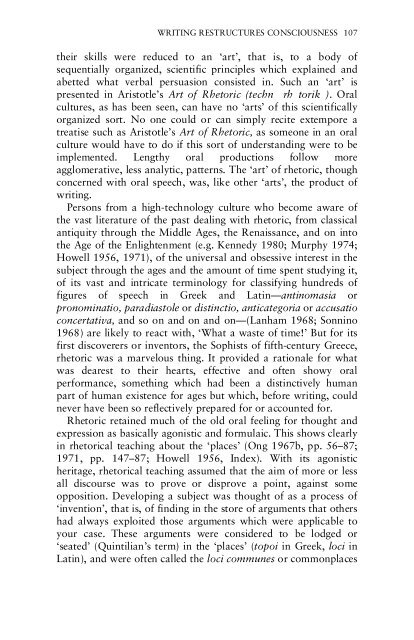Orality and Literacy: The Technologizing of the Word - Monoskop
Orality and Literacy: The Technologizing of the Word - Monoskop
Orality and Literacy: The Technologizing of the Word - Monoskop
Create successful ePaper yourself
Turn your PDF publications into a flip-book with our unique Google optimized e-Paper software.
WRITING RESTRUCTURES CONSCIOUSNESS 107<br />
<strong>the</strong>ir skills were reduced to an ‘art’, that is, to a body <strong>of</strong><br />
sequentially organized, scientific principles which explained <strong>and</strong><br />
abetted what verbal persuasion consisted in. Such an ‘art’ is<br />
presented in Aristotle’s Art <strong>of</strong> Rhetoric (techn rh torik ). Oral<br />
cultures, as has been seen, can have no ‘arts’ <strong>of</strong> this scientifically<br />
organized sort. No one could or can simply recite extempore a<br />
treatise such as Aristotle’s Art <strong>of</strong> Rhetoric, as someone in an oral<br />
culture would have to do if this sort <strong>of</strong> underst<strong>and</strong>ing were to be<br />
implemented. Lengthy oral productions follow more<br />
agglomerative, less analytic, patterns. <strong>The</strong> ‘art’ <strong>of</strong> rhetoric, though<br />
concerned with oral speech, was, like o<strong>the</strong>r ‘arts’, <strong>the</strong> product <strong>of</strong><br />
writing.<br />
Persons from a high-technology culture who become aware <strong>of</strong><br />
<strong>the</strong> vast literature <strong>of</strong> <strong>the</strong> past dealing with rhetoric, from classical<br />
antiquity through <strong>the</strong> Middle Ages, <strong>the</strong> Renaissance, <strong>and</strong> on into<br />
<strong>the</strong> Age <strong>of</strong> <strong>the</strong> Enlightenment (e.g. Kennedy 1980; Murphy 1974;<br />
Howell 1956, 1971), <strong>of</strong> <strong>the</strong> universal <strong>and</strong> obsessive interest in <strong>the</strong><br />
subject through <strong>the</strong> ages <strong>and</strong> <strong>the</strong> amount <strong>of</strong> time spent studying it,<br />
<strong>of</strong> its vast <strong>and</strong> intricate terminology for classifying hundreds <strong>of</strong><br />
figures <strong>of</strong> speech in Greek <strong>and</strong> Latin—antinomasia or<br />
pronominatio, paradiastole or distinctio, anticategoria or accusatio<br />
concertativa, <strong>and</strong> so on <strong>and</strong> on <strong>and</strong> on—(Lanham 1968; Sonnino<br />
1968) are likely to react with, ‘What a waste <strong>of</strong> time!’ But for its<br />
first discoverers or inventors, <strong>the</strong> Sophists <strong>of</strong> fifth-century Greece,<br />
rhetoric was a marvelous thing. It provided a rationale for what<br />
was dearest to <strong>the</strong>ir hearts, effective <strong>and</strong> <strong>of</strong>ten showy oral<br />
performance, something which had been a distinctively human<br />
part <strong>of</strong> human existence for ages but which, before writing, could<br />
never have been so reflectively prepared for or accounted for.<br />
Rhetoric retained much <strong>of</strong> <strong>the</strong> old oral feeling for thought <strong>and</strong><br />
expression as basically agonistic <strong>and</strong> formulaic. This shows clearly<br />
in rhetorical teaching about <strong>the</strong> ‘places’ (Ong 1967b, pp. 56–87;<br />
1971, pp. 147–87; Howell 1956, Index). With its agonistic<br />
heritage, rhetorical teaching assumed that <strong>the</strong> aim <strong>of</strong> more or less<br />
all discourse was to prove or disprove a point, against some<br />
opposition. Developing a subject was thought <strong>of</strong> as a process <strong>of</strong><br />
‘invention’, that is, <strong>of</strong> finding in <strong>the</strong> store <strong>of</strong> arguments that o<strong>the</strong>rs<br />
had always exploited those arguments which were applicable to<br />
your case. <strong>The</strong>se arguments were considered to be lodged or<br />
‘seated’ (Quintilian’s term) in <strong>the</strong> ‘places’ (topoi in Greek, loci in<br />
Latin), <strong>and</strong> were <strong>of</strong>ten called <strong>the</strong> loci communes or commonplaces

















